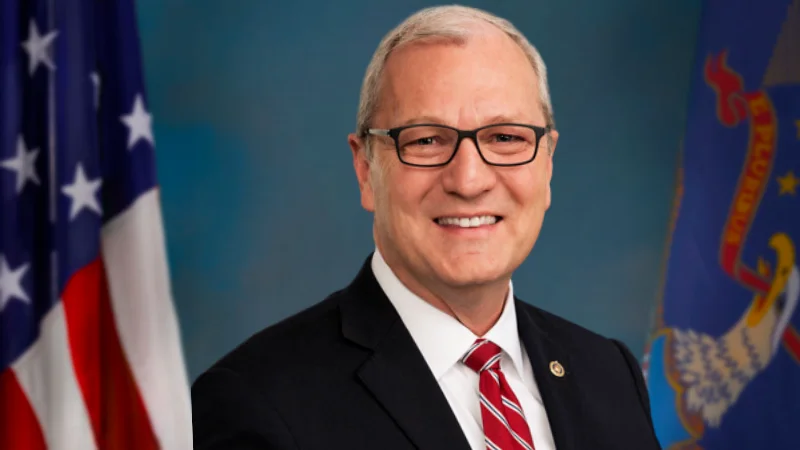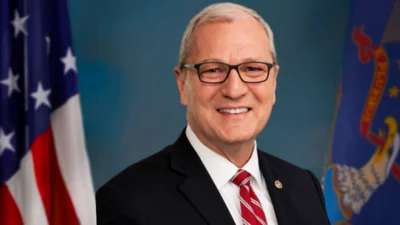Senator Kevin Cramer, US Senator for North Dakota | Senator Kevin Cramer Official website
Senator Kevin Cramer, US Senator for North Dakota | Senator Kevin Cramer Official website
The U.S. Senate has passed three bipartisan appropriations bills for Fiscal Year 2026, allocating funding to military construction, veterans’ affairs, agriculture, rural development, food and drug oversight, technology infrastructure, security measures, and the legislative branch.
Senator Kevin Cramer highlighted North Dakota’s contributions to national food production and security. He stated: “As us North Dakotans know, our state contributes a great deal to feeding, fueling, and protecting the nation and our bill that we passed tonight really reflects that critical role,” adding: “It also includes my bipartisan language that ensures North Dakota is not neglected when we pursue suicide prevention grants for our veterans. Boy, I applaud Senate Appropriators for clearing these measures out of committee with strong, bipartisan support and to Majority Leader John Thune for keeping his promise to move through regular order. This has to be replicated for the rest of the appropriations process to ensure we have a transparent process that engages all the members of Congress and restores confidence in the Congress among the people of our country.”
The Military Construction and Veterans Affairs bill provides funding for Department of Defense military construction projects. It maintains restrictions on realignment or closure of Guantanamo Bay and prohibits the Department of Veterans Affairs from buying technology equipment from certain Chinese manufacturers listed by several federal agencies. The legislation aims to improve VA medical care, upgrade information technology systems at VA facilities, support electronic health records for veterans, and enhance access to mandatory benefits. Additional provisions address nutrition programs for veterans and identification efforts at veteran cemeteries.
Funding is included for designing a National Guard Armory in Jamestown. The Supportive Services for Veterans Families program will receive $702.8 million; this program serves all counties in North Dakota through regional Community Action Agencies.
Senator Cramer has worked as part of SVAC to improve mental health care access for veterans across locations. In April, he joined Senator Chris Coons in introducing the Every State Counts for Veterans Mental Health Act—a measure prioritizing grant applications from states like North Dakota that have not previously received suicide prevention funds.
For agriculture and rural development initiatives, the legislation supports food supply chain security and funds research programs aimed at protecting crops and livestock from disease while supporting domestic marketing efforts. Resources are allocated to help ranchers comply with electronic identification tag requirements; $10.5 billion is provided in farm loans with $1.6 billion going to the Farm Service Agency (FSA), which will keep county offices open.
A total of $3.6 billion will fund agricultural research programs such as those run by the Agricultural Research Service and National Institute of Food and Agriculture—intended to maintain U.S leadership in innovation within farming practices. The bill also calls on USDA to report on research spending involving adversarial countries including China, Russia, North Korea, and Iran.
Rural communities will benefit from $1.7 billion each in rural development programs and rental assistance; housing loans totaling $26 billion; water/waste grants worth $1.3 billion; small business support at $1.8 billion; immediate broadband grants amounting to $96 million plus over $550 million in telecom loan authority; continued funding for ReConnect pilot broadband networks; Community Connect Grant Program allocations; direct telecom loans ($350 million); guaranteed telecom loans ($200 million); as well as rural electric loan authority ($8 billion) intended for grid modernization.
Food assistance remains funded through programs serving seniors (Commodity Supplemental Food Program) as well as mothers/children (Special Supplemental Nutrition Program).
Within legislative branch funding: The U.S Capitol Police receives $865 million split between personnel costs ($653 million) and equipment/operations ($201 million), with reimbursement authority up to $10 million for mutual-aid support efforts. The Architect of the Capitol is allotted $545 million with conditions restricting bonuses if deadlines or budgets are missed; Library of Congress receives $592 million—including Congressional Research Service ($136 million) & National Library Service ($66 million). Budget transparency enhancements include Congressional Budget Office funding at $71 million while Government Accountability Office gets $812 million.
There are ongoing bans preventing both USCP/AOC from purchasing drones made in China or acquiring telecommunications equipment from Huawei or ZTE Corporation.


 Alerts Sign-up
Alerts Sign-up